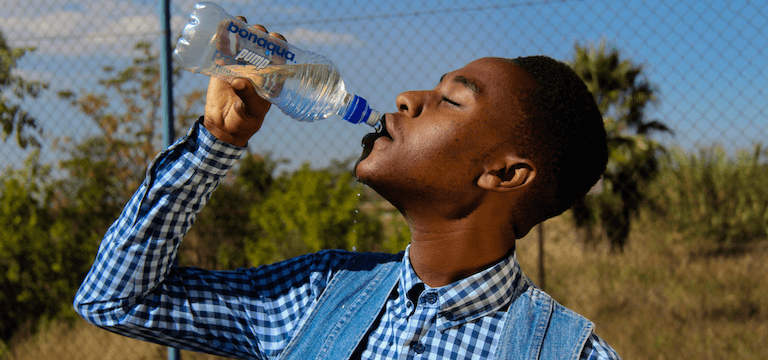
People experiencing urinary incontinence often turn to extreme measures to avoid uncomfortable or embarrassing situations, including limiting their fluid intake overall. Although it might seem logical, drinking less throughout the day is not the answer. Restricting your water intake will not make you pee any less. In fact, you may feel like you have to pee more!
As the amount of water you consume decreases, your urine becomes concentrated. It will begin to irritate the inner lining of your bladder wall. When your bladder becomes irritated, it sends signals to your brain. Your brain sends instructions back to your bladder to contract and empty itself of urine. The need to contract is so intense that your brain doesn’t consider if the bladder is full or not.
How much water should you drink in a day?
You should drink 6-8 cups of fluids per day. If you plan on exercising or spending your day under the sun, you will need more. Your fluid intake does not necessarily have to be water. Milk, coffee, tea, and juice are all good to drink in moderation and according to what your gut and bladder can tolerate.
Here’s how different drinks influence the bladder:
- Caffeine: Caffeine is in coffee, tea, energy drinks, chocolate drinks, and certain medications. It relaxes the muscles of your pelvic floor and urethra, which means it cannot counteract the effects of a contracting bladder, leading to incontinence. Also, caffeine limits the amount of sleep you receive, and you will find that you will get up more in the middle of the night to use the toilet.
- Alcohol: Alcohol is a diuretic. It promotes diuresis, or the increased production of urine. As you fill your bladder with more urine faster, you will need to go to the bathroom more often to relieve yourself. You will also dehydrate quicker and want to drink more water, quickly filling your bladder. Dehydration will create more concentrated urine that irritates your bladder and increases urinary urgency if you don’t quench your thirst.
- Sugar: Fruit juices, energy drinks, and sodas can have a lot of sugar. Sugary drinks can also stimulate the bladder wall and cause an increased urge to urinate. Even natural sugars and honey can irritate the bladder. Excessive glucose can be inflammatory to your nerves and tissues, which results in burning, stinging, or tingling sensations throughout your body. Sugar is a food source for bacteria, so your chances of getting a urinary tract infection increase. Also, note that certain fruit juices are highly acidic and will irritate the bladder.
- Milk: Dairy products can make your bladder symptoms worse. Too much calcium in your diet, through milk or calcium carbonate supplements, causes your blood to become more alkaline. Increased calcium in your blood can cause damage to your kidneys. This, in turn, can lead to incontinence issues and increased urinary frequency.
How much should you pee in a day?
Six to eight cups of fluid intake equate to 48 to 63 ounces of fluid a day. You should be producing at least 40 to 50 ounces of urine a day. Typically, you’ll feel the urge to void around 10 ounces of fluid in your bladder. The desire to urinate is suppressed in your sleep, so you’ll wake up and void about 15 ounces of urine and then void anywhere from 7 to 10 ounces throughout the day, usually 6 to 8 times a day. Anything more or less will need to be investigated.
If you are having issues with urinary incontinence, keep a voiding diary for 3 to 7 days to track when you pee and how much. It’s also helpful to record if you had an urge sensation or experienced any accidents throughout the day. You can compare your voiding pattern with the food and drinks you consume at specific times of the day. Share this information with your physical therapist, who can help you interpret the data and create a Timed Voiding Program with you.
